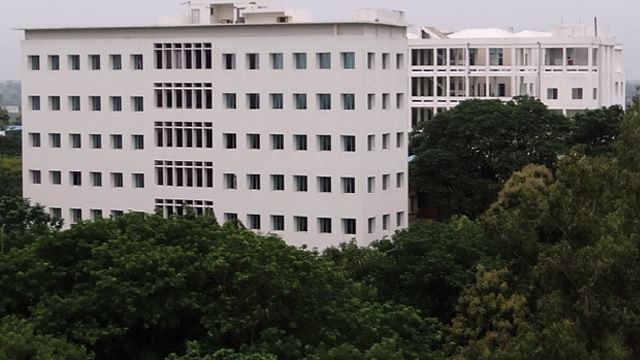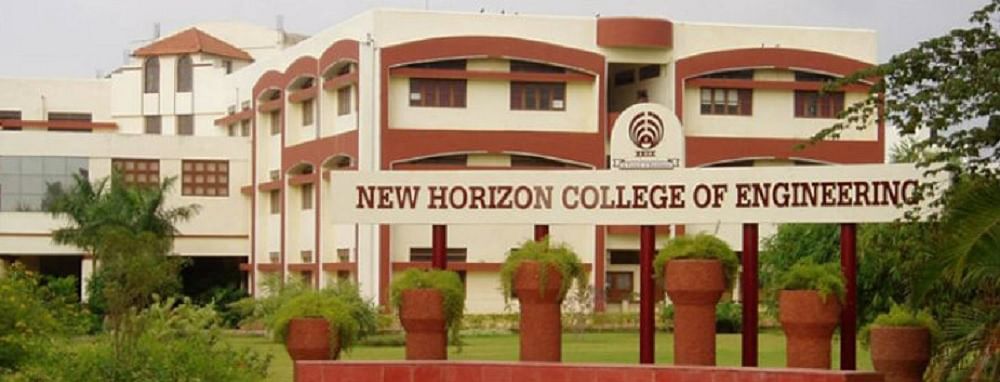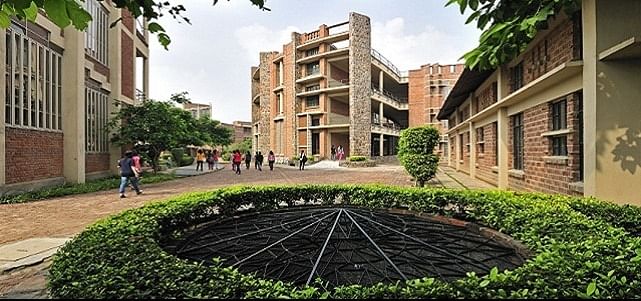M.Tech Electrical and Electronics Engineering

M.Tech Electrical and Electronics Engineering is a two-year-long full-time postgraduate course that deals with the knowledge of designing and developing manufacturing plants and various electrical equipment and instruments. Students are equipped with electronics, information technologies, signal and image processing, electrical energy, biomedical instruments, space applications, and technologies. This course offers ample job opportunities to students, and they can work as Manufacturing System Engineers, Electronics Engineers, Control and Instrumentation Engineer, Electrical Engineer, etc., in different sectors.
Table of Contents
- About M.Tech Electrical and Electronics Engineering
- Eligibility Criteria for M.Tech Electrical and Electronics Engineering
- How To Get Admission in M.Tech Electrical and Electronics Engineering?
- Popular Entrance Exams for M.Tech Electrical and Electronics Engineering
- Top 10 M.Tech Electrical and Electronics Engineering Colleges in India
- Fee Structure for M.Tech Electrical and Electronics Engineering
- Syllabus and Subjects for M.Tech Electrical and Electronics Engineering
- Why Choose M.Tech Electrical and Electronics Engineering?
- Scope For Higher Education
- Salary of an M.Tech Electrical and Electronics Engineering Graduate
- Career Options After M.Tech Electrical and Electronics Engineering
- Skills That Make You The Best M.Tech Electrical and Electronics Engineering Graduate
M.Tech Electrical and Electronics Engineering Course Details
| Degree | Masters |
| Duration | 2 Years |
| Age | No specific age limit |
| Subjects Required | B.Tech/B.E/MCA/M.Sc/Other equivalent degrees |
| Minimum Percentage | 50-60% |
| Average Fees | ₹20K - 2 LPA |
| Average Salary | INR 3- 8 LPA [Source: Payscale] |
| Employment Roles | Manufacturing System Engineers, Electronics Engineers, Control and Instrumentation Engineer, Electrical Engineer, etc. |
About M.Tech Electrical and Electronics Engineering
M.Tech in Electrical and Electronics Engineering is a two-year postgraduate program that aims to explore and enhance the knowledge of power and electronics. It is a course in the engineering spectrum that prepares students for both electrical and electronic sciences. M.Tech course is a master’s program in the field of engineering, and hence, students get a chance to learn about the concepts in great detail and depth.
M.Tech Electrical and Electronics Engineering is categorized into various specializations that students can choose from. It aims to create professionals for the electronics and electrical industries who can bring dynamic advancement to the organization.
Eligibility Criteria for M.Tech Electrical and Electronics Engineering
M.Tech Electrical and Electronics Engineering admission is offered to only those students who meet the eligibility requirements. The minimum M.Tech Electrical and Electronics Engineering eligibility requirement include, students must have pursued an undergraduate degree in B.Tech/BE in any relevant engineering stream with a minimum aggregate of 50% from a recognized Institute or Master Degree in Science with Mathematics. There is no specific age limit for M.Tech in Electrical and Electronics Engineering. Students should additionally pass the National Level entrance exam GATE or other entrance exams conducted by colleges for admission.
How To Get Admission in M.Tech Electrical and Electronics Engineering?
For pursuing M.Tech in Electrical and Electronics Engineering, students must ensure that they satisfy the eligibility criteria. While some colleges offer admission to the M.Tech Electrical and Electronics Engineering program based on marks obtained by students in the national level entrance exam GATE, other colleges conduct entrance exams for testing the eligibility of students for admission. Applications for admissions may be availed both from the University website or by directly visiting the college's admissions office. Mentioned below are the details of the admission process in general:
How to Apply?
M.Tech Electrical and Electronics Engineering course information for admissions can be found on the college's official websites in which the students want to apply. Admission registration can be carried out through online and offline methods. Students must visit the college campus for offline admissions, fill out the application form, collect the brochure, and submit all the required documents. For online applications, students should visit the college's admission website and fill out the application form. The submission of the application fees can be made via online money transfer or through cheques/demand drafts from the bank. On submission of the application form, students will receive further correspondence from the college.
Selection Process
The selection process for M.Tech Electrical and Electronics Engineering in India is primarily based on the aspirant's entrance exam marks. Some colleges conduct entrance exams for admission. Based on the merit obtained by the student in the qualifying exam or an entrance exam, the shortlisted candidates are called for the group discussion and personal interview rounds conducted by the colleges. Based on the overall marks obtained by the students, the eligible candidates are offered admission to the program. Admission is strictly offered to only those students who clear the minimum cut-off of the respective college and fulfill the eligibility requirements. The admit card and other details regarding the exam are notified on the college website beforehand. The students are informed about the results through email communication or can visit the colleges' official website.
Read More on M.Tech Admission
Popular Entrance Exams for M.Tech Electrical and Electronics Engineering
Almost all colleges offering M.Tech in Electrical and Electronics Engineering have an entrance exam-based admission process. The national level entrance exam, GATE, is considered in some colleges while others conduct their entrance exams. Some of the top M.Tech Electrical and Electronics Engineering entrance examinations are:
A Quick Glance at the M.Tech Electrical and Electronics Engineering Entrance Exams
Students who desire to opt for M.Tech Electrical and Electronics Engineering should study the exam pattern and syllabus well before time. This will help students in timely preparation for the entrance exams. In general, the most popular entrance exam, GATE, has the following pattern:
- Sixty-five questions carrying 100 marks, which are to be completed in 3 hours or 180 minutes.
- There are three sections, including General Aptitude, Engineering Mathematics, and Core Subjects.
- The Engineering Mathematics will carry around 15% of the total marks, the General Aptitude section will carry 15% of the total marks, and the remaining 70% of the total marks is devoted to the core subject of the paper.
- GATE would contain questions of two different types are Multiple Choice Questions (MCQs) and Numerical Answer Questions.
Top 10 M.Tech Electrical and Electronics Engineering Colleges in India
M.Tech Electrical and Electronics Engineering colleges are located all across the country in different regions. Students can opt for the best college depending upon their merit and specialization needed. Some of the top M.Tech Electrical and Electronics Engineering colleges in India are:
|
Sl. No. |
Name of the Institute |
|
1 |
|
|
2 |
|
|
3 |
|
|
4 |
|
|
5 |
|
|
6 |
|
|
7 |
|
|
8 |
|
|
9 |
Mukesh Patel School of Technology Management and Engineering |
|
10 |
Fee Structure for M.Tech Electrical and Electronics Engineering
The M.Tech Electrical and Electronics Engineering fees for various colleges in India is around INR 1.5 - 3 LPA. The course fees may vary based on the type of institute, location, infrastructure, faculties, and facilities available.
|
Sl. No. |
Name of the Institute |
Average Annual Fees |
|
1 |
VIT University, Vellore |
INR 1.80 LPA |
|
2 |
Indian Institute of Technology, Kharagpur |
INR 2.10 LPA |
|
3 |
Delhi Institute of Technology, Delhi |
INR 1.60 LPA |
|
4 |
Indian Institute of Technology, Rorkee |
INR 2.12 LPA |
|
5 |
SRM University, Kanchipuram |
INR 1.60 LPA |
Syllabus and Subjects for M.Tech Electrical and Electronics Engineering
M.Tech Electrical and Electronics Engineering duration is two years with four semesters. The M.Tech Electrical and Electronics Engineering syllabus deals with designing and developing manufacturing plants and various electrical equipment and instruments to meet the needs of businesses and other organizations. The program offers various specializations like Signal Processing, Bio-Electronics, Power and Energy System Engineering, Sensor System Technology, Electrical Energy systems etc. The curriculum consists of core and elective subjects like Modern Control Theory, Mathematics, Power System, Digital Control and Controller Design, etc. Listed below are few core subjects in the course:
- Modern Control Theory
- Digital Control and Controller Design
- Power Electronic Circuit and System
- Advanced Power System Operation Control
- Solid State Controlled Electrical Drives
Read More on M.Tech Electrical and Electronics Engineering Syllabus & Subjects
Why Choose M.Tech Electrical and Electronics Engineering?
Students often wonder about M.Tech Electrical and Electronics Engineering details before choosing the course. Before deciding on a career, students come across queries like, "What is M.Tech in Electrical and Electronics Engineering?" and "Why choose M.Tech in Electrical and Electronics Engineering?”. To clearly understand answers to these questions, we have framed the following three pointers:
What is M.Tech Electrical and Electronics Engineering All About?
M.Tech in Electrical and Electronics Engineering is a two-year-long postgraduate course that trains eligible students to efficiently design, operate, and maintain electronics and electrical energy infrastructure. The course is well structured to make students valuable professionals for the automotive, robotics, aerospace, power systems, electronic appliances, and manufacturing industries. The course equips students with the ability to apply advanced-level knowledge, techniques, skills, and modern electrical and electronics engineering tools. The course is further divided into many specializations that students can choose from, depending on their subjects and areas of interest.
What Does a M.Tech Electrical and Electronics Engineering Graduate Do?
M.Tech in Electrical and Electronics Engineering offers a wide range of career options for graduates in both private and public organizations. Electrical engineers are responsible for the generation, transfer, and conversion of electrical power, while electronic engineers are concerned with the transfer of information using radio waves, electronic circuits, computer systems, and the development of control systems such as aircraft autopilots. Upon completing the course, students can work as Manufacturing System Engineers, Electronics Engineers, Control and Instrumentation Engineer, Electrical Engineer, etc. In addition, students can also opt for a teaching career in both govt. and private educational institutions.
Electronics Engineer: Engineers are responsible for the flawless setup and execution of electronics systems. They create, design, and develop everyday devices such as mobile phones, portable music devices, and computers. Electronic engineering offers the chance to produce innovations and developments in telecommunications, robotics, computing hardware, and power and electrical equipment.
Reasons Why M.Tech Electrical and Electronics Engineering Can Fetch You a Rewarding Career?
M.Tech in Electrical and Electronics Engineering can be a rewarding career for graduates as it trains students for exciting and successful careers in electrical and electronic systems engineering. It offers ample opportunities to students in various sectors like Research and Development, Teaching, Manufacturing, and Service organizations. This course offers ample opportunities to graduates in both private and public organizations.
Career Scope and Options: Electronics and electrical engineers work in a rapidly advancing profession that is key to developing the world's IT. With the continuous advancement in technology, the demand for such graduates is continuously increasing. Students are lucratively hired in automotive, robotics, aerospace, power systems, electronic appliances, manufacturing, and industrial research. Also, students have options to go for teaching and research work.
Read More on M.Tech Electrical and Electronics Engineering Jobs
Preparation Tips for M.Tech Electrical and Electronics Engineering
M.Tech in Electrical and Electronics Engineering is an upcoming career option, and students should be well prepared before pursuing the course. Some of the important tips for students seeking admission in M.Tech Electrical and Electronics Engineering are:
Study about the Course: Do a detailed study of the course and its syllabus. Then, choose the best-suited career option and specialization for you.
Improvise Your Skills: For grabbing the best opportunities and good performance throughout the course, improve your mathematical and analytical skills. Also, enhance your communication and problem-solving skills.
Go for Internships: It will be beneficial for the students to go for internships and get real-time work experience.
Be Proficient: Students should have proficiency in mathematics and electronic systems, perform physically and mentally under pressure, and thrive in a team environment.
Scope For Higher Education
M.Tech in Electrical and Electronics Engineering is a master's degree that students pursue after a B.Tech degree. There are many specializations under M.Tech in Electrical and Electronics Engineering that students can opt for. There are also certain higher study options available for graduate students after an M.Tech degree, which can help them better understand the subject. Also, gaining more education can help the students make a career in research or teaching if they are interested in it. Listed below are some of the popular higher education options available for students:
- Ph.D in Electrical and Electronics Engineering
- MBA
- Certificate Course in Engineering
- M.Phil
Salary of an M.Tech Electrical and Electronics Engineering Graduate
The average salary for an M.Tech Electrical and Electronics Engineering graduate is around INR 3-8 LPA (Source: PayScale), which would increase with the experience and skills. M.Tech Electrical and Electronics Engineering graduates can work as Manufacturing System Engineers, Electronics Engineers, Control and Instrumentation Engineer, Electrical Engineer in different private and public sector industries in addition to researcher and academicians. M.Tech Electrical and Electronics Engineering offers excellent job opportunities to students in varied fields like automotive, robotics, aerospace, power systems, electronic appliances, manufacturing, and industrial research. Therefore, this course offers ample opportunities to students both in terms of job and higher education.
Read More on M.Tech Electrical and Electronics Engineering Salary
Career Options After M.Tech Electrical and Electronics Engineering
The M.Tech Electrical and Electronics Engineering program will add to the qualifications of B.Tech graduates, thus improving their chances of getting hired. Such postgraduates are lucratively hired in industries such as manufacturing, automobile, industrial research, power systems, bio-electronics, etc. Some job roles offered to graduates are:
- Design & Validation Engineer
- Professor
- Tools Development Engineer
- Lab Instructor
- Electrical Engineer
- Technical Apprentice
- Manufacturing System Engineers
- Electronics Engineers
- Control and Instrumentation Engineer
Skills That Make You The Best M.Tech Electrical and Electronics Engineering Graduate
M.Tech Electrical and Electronics Engineering graduates should develop good communication and problem-solving skills. They should be good at mathematical skills and should be creative in bringing innovative ideas. A few necessary skills for M.Tech Electrical and Electronics Engineering graduates are:
- Complex Problem-Solving Skills
- Strong Analytical Skills
- Good Technical Skills
- Strong IT Skills
- Critical Thinking
- Strong Networking Skills
























